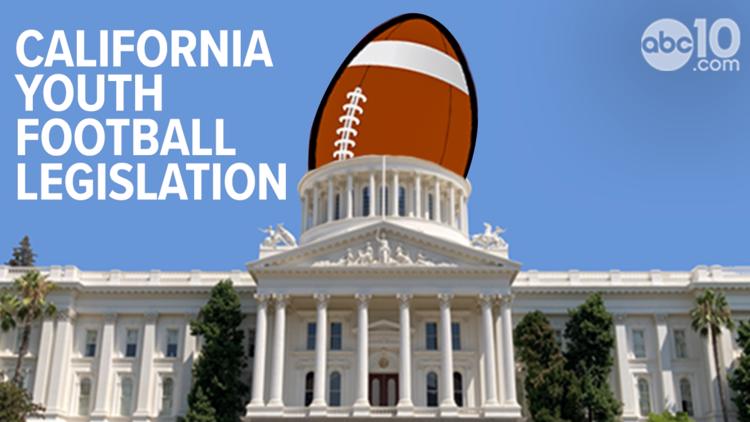SACRAMENTO, Calif. — For generations, parents across America have taken pride in introducing their children to the game of football, along with the benefits that come with practicing the sport.
Youth football coach Steve Famiano is among the most dedicated to keeping the traditional sport – tackle football – accessible to families wanting their kids in the game at any age.
"My boys stopped playing youth football a long time ago. They're getting close to being 30-years-old, so I stayed in it because I love the kids in my community," said Famiano. "(The sport) is a lot more than what you hear about tackle football."
He launched an ongoing social media campaign in 2018 to preserve youth tackle football.
It came after California Assemblymember Kevin McCarty introduced a bill the same year aiming to restrict tackle football in the state for children 12-years-old and younger.
Though the bill failed, McCarty recently introduced a similar bill with the same goal in mind.
He hopes to pass the bill this time around as more people become aware of brain trauma caused by repeated blows to the head, a common occurrence in tackle football.
While most adults playing tackle football are aware of the risks that come with hit-after-hit to the head, McCarty said children with still-developing brains are often at the mercy of their parents when it comes to participation in sports.
"Tackle football, it's American as it can be — It's like apple pie," said McCarty. "And people don't want it to change, but there are certain things where government steps in and sets reasonable regulations for young kids."
The fight for youth tackle football
Though McCarty's 2018 bill failed, Gov. Gavin Newsom passed new restrictions on youth football below middle school in 2019 that included:
- No more than 30 minutes of full-contact practice per day
- No more than two days of full-contact practice per week
- No full-contact practice during the off season
- Greater urgency in evaluating players for head trauma and removing them from the game if necessary
UC Davis Health Sports Medicine Director Dr. Brandee Waite said parents should check out the 'CDC website HEADS UP' for easy-to-understand information on youth sports and concussions.
"Connecting with an athletic trainer or someone else who has experience with head injuries and concussions can give some guidance," said Waite.
Both Waite and McCarty say a safer alternative is flag football that doesn't require physical contact.
“The 2023 NFL Pro Bowl was a flag football game for the safety of the players. Why can’t we have that for our youth?” asked McCarty.
In 2022, the National Institutes of Neurological Disorders and Stroke updated its page on the brain disease known as chronic traumatic encephalopathy (CTE) to confirm the disease is caused in part by repeated traumatic brain injuries.
UC Davis professor and Elk Grove resident Dr. Bennet Omalu is considered the father of CTE research. He was even portrayed by actor Will Smith in the 2015 film 'Concussion.'
Retired WWE wrestler and Harvard University football player Chris Nowinsky is a big follower of Omalu's research. He also earned his Ph.D. in behavioral neuroscience from Boston University.
After his early 2000s athletic career, Nowinsky worked with Omalu to gather data from NFL players suspected to have mental and behavioral health issues. Nowinsky hopes the growing body of CTE research will inform current and perspective tackle football players.
"The problem with football is it's a fun activity, because your brain doesn't have pain nerves in it, and you can't feel the damage you're getting," he said. "So kids will tell you they're having a good time while their brain's getting damaged."
Though Nowinsky and McCarty continue advising parents and lawmakers to restrict youth tackle football, Famiano says he doesn't expect any new laws to pass.
"You'll hear the spiel of CTE and all this other stuff, and utilizing NFL players to promote that kids shouldn't play in this and that, but there's really nothing that has changed since 2018 to 2023 that would make this ban (youth tackle football) bill work," he said. "So you're looking to ban a U.S. sport because something may happen to (a kid's) brain down the road and that's the key word, right? 'May' happen."
Waite says the younger a child starts taking blows to the head, the longer it will take for them to recover from potential brain injuries.
"It seems that the accumulation of more frequent concussions or numerous concussions can have a bigger effect on their thinking down the line, but there's no magic number," she said.





















